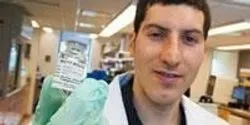News

There is something fishy going on in a vacant house in Detroit's North End, and University of Michigan graduate student Elizabeth "Lizzie" Grobbel takes full responsibility.

Scientists at the National Center for Atmospheric Research (NCAR) and partner organizations launched a major field project across the northern Front Range of Colorado last month to track the origins of summertime ozone, an invisible but harmful pollutant.

An investigation by Princeton University has found no evidence to support an animal rights group's allegations last month that an animal was mistreated at the university.

The average temperature on Earth has barely risen over the past 16 years. ETH researchers have now found out why. And they believe that global warming is likely to continue again soon.

Although HIV can now be effectively suppressed using anti-retroviral drugs, it still comes surging back the moment the flow of drugs is stopped. Latent reservoirs of HIV-infected cells, invisible to the body’s immune system and unreachable by pharmaceuticals, ensure that the infection will rebound after therapy is terminated.
















